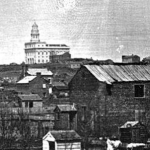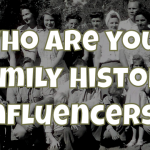All Family History is Social
My DNA results are in. They came in quite unexpectedly, less than 4 weeks after I had sent off my sample.
As expected, they have revealed so far no huge surprises. My heritage is dominantly British with a very healthy representation of Mormon Pioneers. Shocker.
But even if I had not known that before I was still thrilled to get these results.
In the past couple of days since the results arrived I can tell you without reservation that my family history efforts have now risen to an all new level.
You see, now I am connected via DNA to more than 4000 cousins I did not know that I have.
Many of those are fellow test takers who have trees, pictures, and stories – and maybe some answers.
In just a little more than 72 hours I have made a little more than a dozen new contacts, people who have reached out to me first.
I thought that could happen but I didn’t think it would happen so fast and I didn’t think I’d immediately connect with that many.
I did a little prep work in advance of this day.
It took some time but I was able to coordinate the status of my tree on my computer, on FamilySearch.org and on Ancestry.com.
They are all nearly identical now, a fact that has never been true before because I tended to focus my efforts more completely on my personal records.
Now I feel they are all caught up. (Or all equally incomplete, however you care to look at it!)
I knew that once my test was in and connected to my tree I would be given a chance to see the trees of not only a lot more people, but of a lot of family.
I made my tree very obviously public. I did that on purpose.
While I understand why some people keep private trees I do not agree with the practice – at least for the deceased.
I want my tree out there. I want it to be scrutinized and even criticized. I want my tree to be as accurate as possible. I want the information I share to be well sourced and reliable.
But if I have something wrong I want people to show me and help me to fix it.
I will be looking at their trees, too. That’s kind of the point. Doing so gives fresh leads, new sources, and even better ideas of where the next discovery will come from.
I know I won’t see perfection in the trees I’ll be looking at. But I should at least be able to see some new trees I hadn’t seen before.
Sure enough, some of the trees I have seen so far are filled with errors, speculation, and pictures of people who couldn’t possibly have been photographed because they were born and lived well before the advent of the camera.
But just like the ethnicity estimates the DNA testing companies attached to your DNA, these errors you find in the trees of others are hardly the point.
What, then, is the point?
The point is that you connect with your family out there who are working on family history. The social nature of it has power in its own right and the details can all be sorted out after the connection is made.
This is family history in our age.
People turn to social media, specialty DNA websites and online communities first to figure out how to use DNA results and then to connect to the people they find through those results.
There are two things that always results when family finds each other online: first, they learn just how they are related, and second, they share the stories they hold in common but may have never known.
This is why I waited for my DNA results like Christmas morning was coming. I knew it meant meeting a lot of family and that I could and would learn a lot from them.
I don’t know what I don’t know. And I can’t wait to find out what I don’t know about my family.
I think most people feel this way. Or they feel stronger about it than they care to admit.
DNA research, I have learned, is family history for the living. Most tend to focus, and rightfully so, on those who don’t know who their immediate family is. The adopted each have an unknown story and my experience is that they just want to know.
But DNA also plays a vital role even for the most experienced and knowledgeable family historians. It connects living family right now – and gets them talking.
What do you suppose the Millennium will be like?
I see it much like this: family will be sorting out family together.
I can see now how my DNA results are leading me in that direction. I find it exciting.
And I now have more work than a thousand years could possibly resolve. Stay tuned.




Leave a Reply
Want to join the discussion?Feel free to contribute!